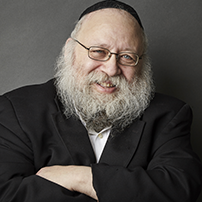
The Torah requires that a woman’s hair be covered. What is so wrong with it being exposed? And why is a shaitel – which can some times be more attractive than natural hair – more acceptable?
According to Halacha, this requirement is restricted to a married woman. What is the difference between a married woman and a single woman with regard to the laws of covering hair? After all, the laws of tzniut, modesty applies to everyone, whether married or single. Why is covering the hair different?
Chassidic thought explains the need for a woman to cover her hair by referring to the difference between the spiritual makeup of women and men.
Men: Unbridled Energy; Women: Near Perfection
Men are in possession of unbridled spiritual energy. Their challenge is the challenge of tzimtzum, looking for ways to contain and limit this energy. Left unchecked, men are likely to wreak havoc. Thus our sages declare: “Who is a strong person? One who conquers his impulse.” For a man to overcome his impulse to satisfy his desire he must muster unnatural strength that goes against his basic nature.
Women are the same spiritual beings men are, except for the fact that they were fashioned by their Creator with the precise amount of spiritual energy needed. By dint of nature, women do not have any excessive spiritual energies with which they cannot cope. Their challenge is not to contain and limit their energies, but to preserve and nurture the Divinity that they possess.
In essence, this dispels the popular notion that men are expected to be aggressive and women are expected to be passive and docile. This misconception derives from confusing their disparate natures with their disparate challenges. A man who is naturally an aggressive being is expected to rise above that aggressiveness by conquering his impulse by exercising self-control. A woman whose spiritual energy is just the way it should be cannot afford to remain passive, because that can lead to the depletion of her spiritual energy. A woman must zealously guard that spirituality and aggressively nurture all that is holy.
In simple language this means that men were created imperfect spiritual beings and women were created to be naturally spiritually balanced.
From the Earth, or From a Rib?
One can see this distinction reflected in the way G-d fashioned Eve from Adam. While Adam was created from the earth and only then did G-d “blow” a soul into his nostrils, Eve was created from Adam after he had already received his spiritual energy. It follows logically that with the creation of Eve, G-d had fashioned a more focused being; one whose spirituality is balanced with her physical dimension.
Femininity is often associated with the earth. In Hebrew, the word Eretz is actually translated to mean “that which desires [to do the will of its Creator.]” This is reflective of the feminine quality that is in a natural state of compatibility with its Creator.
According to some opinions, women are to express their gratitude to G-d by reciting the blessing that ends with the phrase “Who has made me according to His will.” One interpretation of this is that whereas men were not created according to His will – they must struggle to have their bodies conform to G-d’s will – a woman was made that way in the first place. Here natural inclinations are consistent with G-d’s will. This does not mean, of course, that a woman has no free will or cannot sin. It simply means that she has a more natural propensity to doing that which is right and that her greater challenge is to nurture her own spiritual resources and guard them from being depleted and corrupted.
Many will point to the Psalmist’s description of the role of woman as one who is ‘inside,” in the verse: “All the glory of the daughter of the king is inside.” A superficial reading of that would yield a meaning that would prefer that a woman not venture outside her home. The Chassidic interpretation goes much deeper. A woman’s glory is her awareness that here spirituality lies within her to a greater extent than it dos for a man. She need not look for challenges that take her away from her inner self. Her greatest challenge is to become aware of her inner spirituality and to nurture it.
The Mystical Concept of “Hair”
Our sages of Kabbalah have revealed to us that “hair” is representative of the process of tzimtzum, of a reduced measure of Divine energy. When one is in danger of being overwhelmed by too much power, even if it is holy and positive power, the process of tzimzum is crucial for one’s ability to be able to absorb the energy. Tzimzum, or hair, becomes the instrument of generating positive energies.
If, on the other hand, the energy is already reduced and is precisely measured according to the recipient’s capacity, any further process of tzimtzum can have catastrophic consequences. To diminish and filter the positive energies any further is to invite those negative elements that can only exist in an atmosphere of reduced spirituality.
A simple analogy of a tailor made suit illustrates the point. When one has a piece of material one has much liberty in cutting and altering it before it will become useless as a garment. However, once something is tailor made for a specific person, one must use much more care before they try to cut it further.
Our sages thus tell us, therefore, that for a woman to expose her hair — the physical manifestation of tzimtzum — is to reduce her divinely “tailor made” spiritual energies and thus serves as an invitation to the forces of impurity. It is not that a woman should cover her hair because her hair might be attractive and enticing, but that a woman’s hair exposed is an invitation to the forces of impurity. Once these forces are unleashed, all sorts of negative consequences can ensue. The fact that her natural hair might be enticing to a man is merely one dramatic illustration of how a woman’s spirituality might be compromised.
This applies only to living hair that expresses the concept of tzitmzum, inasmuch as hair, notwithstanding its connection to the brain and life force of the person, contains a reduced amount of life. This does not apply to hair once it is removed from the person and is formed into a shaitel. By covering one’s hair, in accordance with the Torah’s requirements, one is thereby guaranteeing that the woman’s spirituality is not depleted and that she can successfully preserve and nurture her Divine identity.
When a woman covers her hair she is thus making a statement about her spirituality and her mission in life as a woman. She is saying, in effect, that she contains an inner spiritual dimension that must be preserved and protected from being depleted or curtailed.
Women are From Malchut; men are From Z”a.
In the terminology of Kabbalah, men are from z”a and women are from Malchut. Z”a or Zeir Anpin represents the emotional attributes of Hashem. Women’s spiritual source is Malchut, the Divine attribute that receives the Divine emanations of z”a. To be able to absorb the Divine energies of z”a, there must be a process of tzimtzum, reduction and condensation of the original energy of z”a. Inasmuch as a woman represents Divine energy that has already undergone the process of tzimtzum, any further tzimtzum would actually distort the G-dly energy and enable it to energize even levels of unholiness
For example: When a brilliant teacher wants to impart some profound idea, he has to filter and screen the idea. Sometimes the brilliant teacher might say a witty remark that appears to be devoid of substantive knowledge. In truth, through the witty remark the brilliant sage has captured the essence of what he wanted to impart to the student. Thus, our sages say: “Even the idle talk of the Talmid Chacham needs to be studied.”
Now, if the student were to devise an analogy for one of his own ideas, the words would indeed qualify as idle talk and would border on nonsense. Because his own ideas have already been subjected to tzimtzum, any further diminution of the idea would be a misrepresentation of the concept. Similarly, a woman who is the recipient of the Divine energy in just the right measure cannot afford to have her energy further reduced through her exposed hair, for that would lead to the corruption of her spiritual identity.
In effect, a woman who covers here hair is making a profound statement about her unique role as the guardian of spirituality. It is a constant reminder that she possesses an internal holiness that is in harmony with her Creator.
Both men and women need reminders of who they are and what their mission is. Men need tefillin and tzitzit to remind them of their obligations. But, these are external symbols and conduits of spirituality. Woman’s reminders are internal. But even a woman can benefit from a reminder. The hair covering, even if it is a beautiful shaitel that she must put on to cover her own hair, is a constant reminder for her to look within herself for her G-dly status.
So Why do Men Have to Cover Their Hair?
And whereas the head of covering of a man is to remind him that G-d is above him, the head covering of a married woman is designed to make her aware of the G-dly energy that is within her. And whereas a man’s inner spirituality might be the cause of his going astray – for which reason he must cover his head to remind him that there is a G-dly purpose that transcends his own G-dly spirit – a woman’s hair covering is intended to prevent her inner spirituality from becoming depleted. A man must look primarily out of himself for guidance; a woman must look into herself for guidance.
The Single Woman
At this point we might be able to answer the question raised before, if it so important for a woman to cover here hair, why does this not apply to the single woman?
One can give the following explanation based on the foregoing kabbalistic model of Malchut and Z”a. Malchut is the Divine instrument of measured holiness that is precisely the level it must be to bring the G-dly energy to the lower worlds. Thus, any more “tampering” with this measured G-dly light that would subject it to further diminution would cause G-d’s presence to be inordinately concealed and it would thus be an invitation for the unholy forces to thrive.
Malchut, however, exists on two plains. Malchut in its higher state is in a state of complete receptivity so as to unite with Z’a in the G-dly world of Atzilut (Emanation), before it descends into the lower world of Beriah to give it life. The danger that can derive from the “hair” or tzimtzum condition as it pertains to Malchut is only inherent in the state of Malchut as it enters into the lower world of Beriah. There it lacks the protection of the world of absolute holiness – Atzilut.
One may suggest that the married woman is one who enters the phase of Beriah. She is no longer in the sublime – single state – of Atzilut. A woman is now ready to begin a home with all of the material concerns and burdens that building a home and family entail. It is precisely in this state that she needs to guard her inner spirituality that it not be depleted or corrupted and serve as an invitation for unholy forces.
In her single state, however, there is no danger that her hair and its dynamic of diminishing the intensity of her spiritual energy will lead to any harm. The reason for this, one might suggest, is that before marriage a woman is still devoid of her primary earthly responsibilities. Furthermore, she is still in her parent’s home and under their influence, the spiritual dangers are less threatening. Particularly in light of Kabbalah and Chassidic thought, parents are representative of the two highest attributes of chochma and binah (conception and intellectual development) in whose light there is no evil, because they represent the state of total bittul-nullification in relation to their transcendent G-dly source. When one’s spiritual faculties of chochma and binah are dominant, the other attributes are in a state of Bittul and cannot possibly lead to any result that is not in consonance with the Divine will.
Moreover, the state before marriage is analogous to Malchut as it is in a state of receptivity to be united with Z’a. In this mode of receptivity and Bittul, there is no potential for harm. This can be understood in light of the Talmudic principle concerning the kashrut of a utensil that when a vessel is in the process of absorbing it does not exude its contents. Only when Malchut assumes the mode of giving to the lower worlds that it becomes vulnerable.
And thirdly, a subsequent “diminution” will have to take place – her entry into an independent home — and therefore, her hair being exposed – symbolizing the diminution of her G-dly energy level – is not an issue.
Only when she makes her final step “down” into the “real” world, it is at that point that she must not allow her Divine energy level to be curtailed further. Now that she is distanced from her parents and is involved in exuding her energy to the lower world of reality, she is required to preserve and nurture here very precise measure of Divine energy. By preserving that inner divinity, a woman can bring light and holiness to her entire family and environment.


